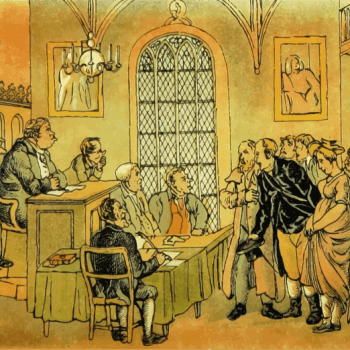R. R. Reno, the editor of First Things, gave a talk on “The Future of Christianity” that was published in The American Conservative. In it, he discusses three trends that he believes will be facing the American church: (1) “The battle between conservative Protestantism and the secularized liberal Protestantism represented by the progressive left will be ongoing.” (2) Christianity as a whole will grow more conservative. (3) “A growing challenge to Christianity from the anti-Christian right.”
I want to focus on number 3. Says Reno,
For most of the modern era, Christianity been criticized by Enlightenment rationalists and those committed to progressive moral causes. That won’t end, but it will be supplemented, perhaps eclipsed, by a Nietzschean vitalism and cult of power that blames Christianity for the suicide of the West.
Nietzsche criticized Christianity not for its failures to live up to its ideals, as in conventional anti-religious rhetoric, but for its noblest ideals and highest accomplishments. The Christian exaltation of love and compassion, he said, keeps the weak alive and makes the strong feel guilty. It flies in the face of Darwinian survival of the fittest, with our animal instincts of sex and aggression, and the individual’s will to power. Therefore it makes for weakness, sentimentality, and cultural dysfunction. As Reno explains it,
Friedrich Nietzsche formulated influential criticisms of Christianity at the end of the nineteenth century. He argued that Christianity champions weakness, while denigrating strength. Its teachings celebrate slavery while condemning mastery. As a consequence, Nietzsche concluded, Christian culture tends toward lifeless mediocrity, inculcating a hostility toward all that is strong and excellent. Against Christianity, Nietzsche preached a pagan vitalism, one that celebrates strength and mastery.
In its secularized form, so the argument goes, this Christian ethic has given us progressivism with its values of social equity, exaltation of the “marginalized,” and moralistic restrictions on freedom in the name of “compassion.” Reno believes that the revulsion against “wokeism” will become so extreme in some circles that Christianity will be blamed.
There seems to be a deep well of resentment, even anger (which in my humble opinion is justified). The world of speech codes, sensitivity training, and endless efforts to promote safety is felt by many to be suffocating. They want something heroic and adventuresome. . . .
There are a growing number of voices on the right who agree with Nietzsche. Christianity, they say, is the source of today’s progressive culture.
Indeed, the libertarian right as championed by Ayn Rand has long attacked Christianity for its altruism, in which individuals are taught to deny themselves and to love their neighbors, which goes against the self-interest required by free market capitalism. Rand sought to replace the Christian virtues of love and selflessness with “the virtue of selfishness.”
Now we are also seeing anti-Christian conservatism in the alt.right, especially the neo-fascists and neo-pagans who laud tribalism, the warrior ethic, and rebellion against moral constraints. Says Reno,
Christianity faces something new (or at least rare). Throughout the modern era, attacks on the Church came largely from the “left.” The Christian God has been deemed an authoritarian dictator, and Christians were thought to be dangerous dogmatists eager to impose their views on others.
Influenced by Nietzsche, there was a radical right in the first decades of the twentieth century that attacked Christianity as “Jewish,” an adjective meant to conjure the image of an unmanly and groveling religion. Hitler and his spokesmen preached bold deeds and promised the courage to strike hard blows. Something of this mentality is returning.
So how should Christianity respond to those kinds of attacks? It is surely telling that Christianity is opposed both by the progressive left and the retrograde right. The progressives attack Christianity for oppressing the poor, while the conservatives attack Christianity for helping the poor. The former blames Christianity for causing wars, while the latter blames Christianity for promoting peace.
This is, of course, what G. K. Chesterton noted in Orthodoxy. Some attack Christianity for its optimism; some for its pessimism. Some for enslaving women; some for being “too feminine.” Some for fighting too much; some for being too pacifist. And on and on. (Read this section available online.) Chesterton concludes,
And then in a quiet hour a strange thought struck me like a still thunderbolt. There had suddenly come into my mind another explanation. Suppose we heard an unknown man spoken of by many men. Suppose we were puzzled to hear that some men said he was too tall and some too short; some objected to his fatness, some lamented his leanness; some thought him too dark, and some too fair. One explanation (as has been already admitted) would be that he might be an odd shape. But there is another explanation. He might be the right shape. . . .Perhaps (in short) this extraordinary thing is really the ordinary thing; at least the normal thing, the centre. Perhaps, after all, it is Christianity that is sane and all its critics that are mad—in various ways.
Indeed, it is absurd to react against one extreme by rushing to its opposite, to oppose progressive sentimentality by rejecting compassion altogether. Or to reject progressive “social justice” by rejecting justice altogether. What we need is a way to correctly order our desires, needs, and values. And Christianity offers that.
Christians, though, should realize that they will find atheists among conservatives, just as they will find atheists among progressives. Religion and politics may influence each other, but they are not the same. Sin and rebellion against God exist across the political spectrum, as Christian political activists soon learn.
Photo: Ayn Rand, By portrait credited to “Talbot” (though not on original dust jacket). Published by the Bobbs-Merrill Company. – Scan via rohrbachlibrary.wordpress.com (direct link to jpg). The portrait as originally published on the dust jacket of The Fountainhead can be seen at this listing on Worthpoint., Public Domain, https://commons.wikimedia.org/w/index.php?curid=90393760


















